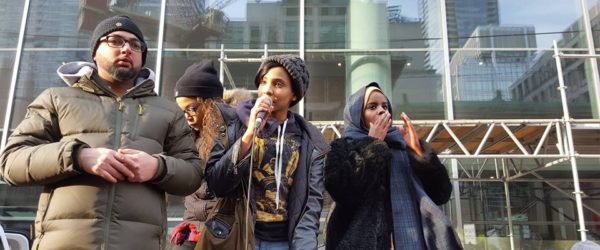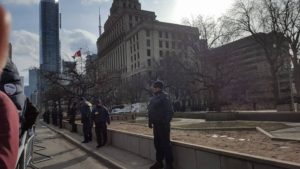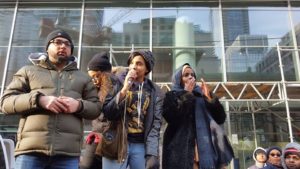I will start this post positioning myself as a cissexual and heterosexual Binizaa–Latinx woman who converted to Islam about ten years ago. I am also an immigrant: a settler to the territories of the Algonquin, Cree, Anishinabe, Haudenosaunee and Métis nations, among others. The positioning is important because to discuss white supremacy is not only to talk about the colonial histories of Turtle Island, but also to identify the many ways in which white supremacy complicates our identities and exercises violence, in different ways, against racialized and “minority” communities.
On January 29th, Muslim communities in Canada were shaken by an attack on a Quebec City mosque that killed six men. Abdelkrim Hassane, Khaled Belkacemi, Aboubaker Thabti, Mamadou Tanou Barry, Ibrahima Barry and Azzeddine Soufiane were killed while in prayer by Alexandre Bissonnette. Bisonnette is a white man who has been referred in the media as a “student ” and a “lone wolf”, in an attempt to normalize racism and white supremacy and make them pose as something that must be understood as mental illness to be accommodated.
The night the news came through was a difficult one for many Muslims, including MMW writers who live in Canada. We exchanged messages and calls to check on each other because we were suddenly reminded that our places of worship, which are sacred for some, are easy targets of violence.
The week after the attack on the mosque, Black Lives Matter Toronto (BLM TO) organized a protest against Islamophobia and white supremacy under the banner of National Days of Action Against Islamophobia & Deportations. In recent years, at least in my view, BLM TO is one of the few movements in Canada which truly gets it. They get that we are on stolen land; that Islamophobia and anti-Blackness are not independent from violence against Indigenous peoples and their territories; that capitalism, heteropatriachy and white supremacy are intrinsically connected; that Black Muslims, especially those within the LGBTIQ experience, are very likely to experience State-condoned and other types of violence; that immigration in itself is a violent process; and that centering the voices of Black queer/trans women, who are the everyday targets of all sorts of capitalist, heteropatriarchal, racist, sexist, homophobic, Islamophobic violence is a challenge to the very nature of the Settler-State.
I was there, in the protest, with a Bangladeshi friend of mine. To be a woman of color in spaces of protest, heavily surrounded by (primarily) white policemen, means that we always know we are at risk of violence and criminalization. Thus, we often make arrangements for friends and family to know where we are and to know to look for us, if we fail to report back. But despite the challenges, protestors, the majority Black, Indigenous and People of Color (BIPoC), continued to fill the streets despite the incredibly cold weather. Some counts say 5,000 people showed up.
For some Muslims, the show of solidarity from all segments of the population has been life-changing. For me, it was seeing Yusra Khogali, co-founder of BLM TO (and a Muslim herself), and Alexandria Symone, member of BLM TO, speak and call Justin Trudeau a white supremacist. Hearing them say the words in front of thousands, felt like a relief… perhaps a validation of much of my own experiences living in Canada and of much of what the women who have mentored me, the majority Indigenous, have taught me. In addition, it was a “f*ck you” moment for those people, immigrants or otherwise, who have an uncritical and relentless love for a white-man who, to date, has broken his campaign promises to everyone, including Indigenous peoples, mingles comfortably with Israel, went back on his promise to change the electoral system and recently agreed to security measures that will criminalize minorities residing in Canada at US borders.
Sadly, but not unexpectedly, Khogali and Symone were heavily attacked in the media, and harassed elsewhere. Khogali, as the co-founder of BLM TO, has been a target not only for her political stance, but also for her Blackness, Muslimness and womanhood. The violence that Khogali has faced is something that many Black women activists experience because the reality of things is that anti-Blackness is something that has always existed in colonial spaces and that we, as immigrants and settlers, adopt and perpetuate. Not only that, gendered violence against Muslim women, particularly Black Muslim women, has been heavily normalized in the past decade in Canada.
But these attacks on Black Muslim women are one of the clearest demonstrations that Khogali is right. Canada is a white supremacist State with a Prime Minister that operates from a system that is inherently violent, and who has not political or personal interest in changing the conditions of the Settler-State in any way. I am neither surprised by the fact that those currently perpetuating violence against Khogali and Symone have found platforms to do so, nor by the fact that as Muslim immigrants, settlers and Indigenous peoples we are often reluctant to speak of white supremacy, let alone, call the Prime Minister of Canada a white supremacist. It seems that we give white men, with State-sanctioned powers to exercise violence, the benefit of the doubt any day, but God forbid a Black Muslim woman calls out racism, because hell breaks loose.
To name white supremacy and believe those who are always conceived as “the other” (i.e. Black Muslim women) goes against narrative of the “good immigrant.” In this narrative you come to Canada, work hard, learn English, adopt “Canadian values” and assimilate in order to succeed. In addition, engaging in a critical exercise requires a deep analysis of our own colonial trauma, through which we have become deferent to colonial governments, to white-male leaders, to capitalism, to patriarchal relations, to white feminism, etc. But we are at a point, perhaps we have always been there, where our silence, our complicity, our anti-Indigeneity and our anti-Blackness result in peoples’ deaths.
These are very real things. We stay quiet, people die. It may not be “our people” today, but it will come. In fact, six Muslims were shot a few weeks back…
To attack a Black Muslim woman for calling out white supremacy in a Settler-State that has flushed through the genocide of Indigenous peoples, the enslavement of Black communities, the forced and low-paid labour of East Asian communities, the banning of non-white immigrants, the criminalization of LGBTIQ and disabled people and geopolitical abuse towards Third World countries, is to become a white-supremacy-bureaucrat… a person who participates in the upholding, endorsing and dissemination of white supremacy through discrimination, racism, sexism, Islamophobia, homophobia and ableism, and/or someone who believes that upholding such behaviours will lead to rewards or better status and acts on it.
But let’s be clear as Muslims and immigrants, we may occasionally benefit from being white-supremacy-bureaucrats, just like Muslim women may benefit from participating in patriarchal structures. Yet, the Canadian state was not created with BIPoC, Muslims or other minorities’ wellbeing in mind. It was created for white settlers, and to date, such is the case. We see it in the number of missing and murdered Indigenous women, the number of visible Muslim women attacked in the last decade, the fact that both Conservative and Liberal governments uphold the criminalization of Muslims, in the numbers of Black people criminalized and killed on Canadian streets, in the rising unemployment and discrimination among racialized youth, and in the fact that to be considered a real “Canadian Citizen” and maintain such a status, we are required to participate in the oppression of others.
As Muslims living on this land, is this really the best we can do? More importantly, as non-Black immigrants and settlers, is the role of the white-supremacy-bureaucrat what we aspire to?



